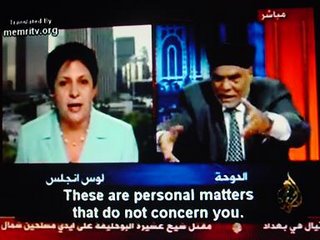 Wafa Sultan has been described as a hero, a reformist, a crusader and a brave woman speaking out against Islamic extremism. In 2006, Time Magazine named her one of the 100 most influential people ‘whose power, talent or moral example is transforming the world.’ It praises her for expressing openly views widely shared by other Muslims but rarely aired, writes Vida Adamoli.
Wafa Sultan has been described as a hero, a reformist, a crusader and a brave woman speaking out against Islamic extremism. In 2006, Time Magazine named her one of the 100 most influential people ‘whose power, talent or moral example is transforming the world.’ It praises her for expressing openly views widely shared by other Muslims but rarely aired, writes Vida Adamoli.
Wafa Sultan, born to a Sunni Muslim family in Damascus, Syria, emigrated to the United States 1989. In 2001 she began taking part in the political debates on Al-Jazeera and CNN that brought her to public attention.
.
Sultan believes that Islam is more than just a religion. It is also a
political ideology that preaches violence and applies its agenda by
force. She says she was shocked into secularism by the 1979 atrocities
committed by Islamic extremists of the Muslim Brotherhood against
innocent Syrians. Included among them was Yusef al Yusef, a renowned
ophthalmologist who taught at the University of Aleppo where she studied medicine. Wafa Sultan was present when machine-gun wielding thugs assassinated him in front of his class. ‘They shot hundreds of bullets into him, shouting, “God is
great!” she said. ‘At that point, I lost my trust in their god and
began to question all our teachings. It was the turning point of my
life, and it has led me to this present point. I had to leave. I had to
look for another god.’
On February 21, 2006, Wafa Sultan took part in Al Jazeera's weekly 45-minute
discussion program The Opposite Direction. She spoke from Los Angeles,
arguing with host Faisal al-Qassem and with Ibrahim Al-Khouli about
Samuel P. Huntington's Clash of Civilizations theory. A six minute
composite video of her remarks was subtitled and widely circulated by
MEMRI on blogs and through e-mail; The New York Times estimated that it
had been seen least one million times.
